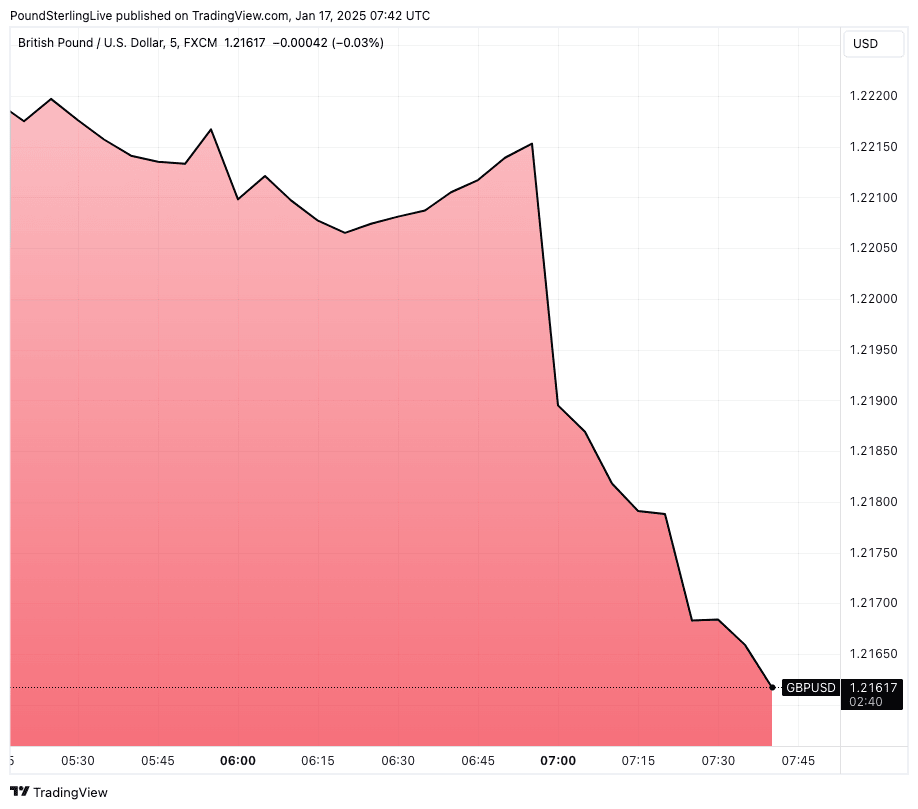Stinking Retail Sales Report Sees Pound Sterling Add to Losses against Euro and Dollar
- Written by: Gary Howes

Image © Adobe Images
The British Pound fell against the Euro, Dollar and other currencies after the ONS revealed a shock decline in retail sales for December.
The Pound to Euro exchange rate dropped from 1.1872 to 1.1842 in the minutes that followed news UK retail sales fell 0.3% in December. The Pound to Dollar exchange rate dropped from 1.2215 to 1.2185.
The fall is because the market was prepared for a decent bounce of 0.4% in December, which is a crucial month for the UK's retail sector.
News of the -0.3% decline represents a significant miss that confirms UK consumers are in hibernation, which poses significant downside risks to economic growth in the coming months.
Compare Currency Exchange Rates
Find out how much you could save on your international transfer
Estimated saving compared to high street banks:
£2,500.00
Free • No obligation • Takes 2 minutes
Retail sales were 3.6% year over year in December, well below the consensus estimate of 4.2%.
The miss in expectations was largely down to food stores, a sector dominated by supermarkets, where sales volumes fell 1.9% on the month, putting the index at its lowest level since April 2013.
"Despite the festive season, consumers tightened their belts, with ongoing financial pressures and caution around the cost of living weighing heavily on spending," says Phil Monkhouse, UK Country Manager at Ebury. "Looking ahead, with the Bank of England holding rates at a frosty 4.75% and fresh concerns around the UK’s growth outlook, there could still be room for downside in consumer confidence."
Above: GBP dropped as the retail sales figures came out.
Retail sales data are the latest to point to the significant slowdown in economic growth that has followed the Labour Party's victory in July.
A barage of negative messages about the economy, tax rises, minimum wage rises and new red tape have sent business sentiment plummeting, and it looks as though consumer activity is also suffering.
The British Pound's decline in 2025 reflects these emerging realities on the ground.
However, Lisa Hooker, an analyst at PwC, says the consumer might not be as downbeat as the headlines suggest.
"There are some positive signs of consumer spending momentum, particularly in the leisure sector. This reflects the higher disposable income of typical households following wage increases, lower inflation and lower national insurance contributions experienced in 2024," she explains.
This suggests consumers are choosing to put their money into experiences and not the shops.
Hooker says hospitality and travel have reported far better results over the period, with more returning to holidaying over the festive period.
Rising Prices to Pressure the Sector
Analysts say retailers might continue to struggle in 2025 as they look to pass on the cost of higher taxes and wages to customers.
"2025 will see a return to higher price inflation as retailers pass on the increasing cost of doing business, in particular, due to the National Living Wage and employer National Insurance contributions from April," says Hooker.
The tax on wages - National Insurance - will increase in April, while the threshold at which the tax becomes liable also increases. The minimum wage will meanwhile see a second consecutive year of above-inflation increases.
This is all paid for by businesses, with retailers being particularly prone to the increases as the sector is a major employer of those on the minimum wage.
"The lacklustre results are a triple negative for retailers as they go into 2025. The softer close to 2024, will be compounded by the growing tax burden levied by the increase in the employer’s national insurance contributions. Add to that rising customer expectations, and brands face a tough 2025," says David Paulding, VP of International at Nextiva.
The Bank of England Will React By Cutting Interest Rates
The UK recorded a below-consensus 0.1% month-on-month economic growth rate for November, while inflation unexpectedly undershot expectations by 0.1 ppt in December.
Slowing retail sales will add to signs of subdued demand, which will give the Bank of England confidence that inflation will track expectations.
Markets now think a February rate cut at the Bank is a near certainty, and see heightened chances that three further rate cuts are delivered this year.






